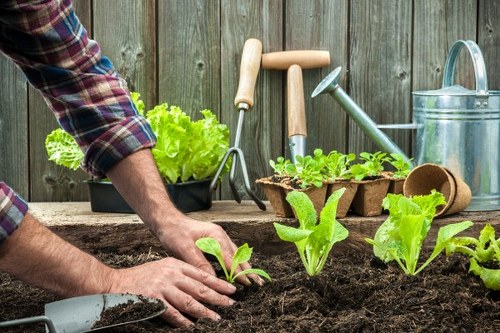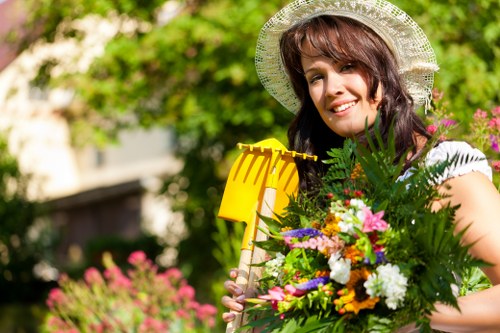Ultimate Guide to Garden Maintenance in Barnet

Introduction to Garden Maintenance
Maintaining a beautiful garden in Barnet requires dedication, knowledge, and the right techniques. Whether you're a seasoned gardener or a novice, understanding the essential aspects of garden upkeep can transform your outdoor space into a vibrant and thriving oasis.
In Barnet, the climate and soil conditions play a significant role in determining the best maintenance practices. By tailoring your approach to the local environment, you can ensure your garden remains healthy and aesthetically pleasing throughout the year.
From planting and pruning to pest control and irrigation, this guide covers all the crucial elements of garden maintenance specific to Barnet's unique landscape.

Seasonal Garden Care
Spring Maintenance
Spring is a vital time for garden maintenance in Barnet. As the weather warms, it's essential to prepare your garden for the growing season ahead.
- Soil Preparation: Test and enrich your soil with compost or organic matter to promote healthy plant growth.
- Planting: Start sowing seeds and transplanting seedlings for flowers, vegetables, and shrubs.
- Pruning: Trim back any dead or damaged branches from trees and shrubs to encourage new growth.
Proper spring maintenance sets the foundation for a lush and vibrant garden throughout the year.

Essential Tools for Garden Maintenance
Basic Gardening Tools
Having the right tools is crucial for efficient garden maintenance. Investing in quality equipment can make your gardening tasks easier and more enjoyable.
- Pruners and Shears: For trimming and shaping plants with precision.
- Garden Fork: Ideal for turning soil and aerating the ground.
- Watering Equipment: From hoses to sprinklers, ensure your garden receives adequate moisture.
- Gardening Gloves: Protect your hands while working with plants and soil.
- Wheelbarrow: For transporting tools, soil, and plants with ease.
Equipping yourself with these basic tools can significantly enhance your gardening experience.

Plant Selection for Barnet Gardens
Choosing the Right Plants
Selecting plants that thrive in Barnet's climate is essential for a successful garden. Consider factors like sunlight, soil type, and water availability when making your choices.
- Perennials: Plants like lavender and hostas provide long-lasting color and require minimal upkeep.
- Annuals: Petunias and marigolds add vibrant hues but need to be replanted each year.
- Vegetables: Tomatoes, cucumbers, and lettuce are excellent choices for vegetable gardens.
- Shrubs and Trees: Boxwood and yew are popular for creating structure and privacy.
Consider native plants as they are well-adapted to the local environment, making them easier to maintain.

Pest and Weed Management
Controlling Pests
Keeping pests under control is vital for maintaining a healthy garden. Implementing integrated pest management strategies can help minimize damage without harming beneficial insects.
- Biological Control: Introduce natural predators like ladybugs to combat aphids and other pests.
- Organic Pesticides: Use eco-friendly options to reduce the impact on the environment.
- Manual Removal: Regularly inspect your plants and remove pests by hand.
Weed Control
Weeds compete with your plants for nutrients and water. Effective weed management involves regular maintenance and preventive measures.
- Mulching: Apply a layer of mulch to suppress weed growth and retain soil moisture.
- Hand Weeding: Remove weeds manually to ensure thorough control.
- Herbicides: Use targeted herbicides sparingly to eliminate persistent weeds.
Proactive pest and weed management can significantly enhance the health and appearance of your garden.

Irrigation and Water Management
Efficient Watering Practices
Proper irrigation is essential for the longevity of your garden. Implementing efficient watering practices can conserve water and promote healthy plant growth.
- Drip Irrigation: Delivers water directly to the plant roots, reducing evaporation and runoff.
- Rainwater Harvesting: Collect and store rainwater for use during dry periods.
- Watering Schedule: Water your garden early in the morning or late in the evening to minimize water loss.
Soil Moisture Management
Maintaining optimal soil moisture levels is crucial for plant health. Use mulch to retain moisture and improve soil structure.
- Mulching: Helps to keep the soil cool and moist, reducing the need for frequent watering.
- Soil Amendments: Add organic matter to improve water retention and drainage.
- Moisture Sensors: Install sensors to monitor soil moisture and adjust watering accordingly.
Effective water management ensures your garden remains lush and vibrant even during dry spells.

Pruning and Trimming Techniques
Why Pruning is Important
Pruning is a critical aspect of garden maintenance that promotes plant health, encourages growth, and enhances the overall appearance of your garden.
- Health: Removing dead or diseased branches prevents the spread of infections.
- Shape: Trimming helps maintain the desired shape and size of plants.
- Growth: Encourages the development of new shoots and flowers.
How to Prune Different Plants
Different plants require specific pruning techniques to thrive.
- Flowering Shrubs: Prune immediately after flowering to avoid cutting off next season's buds.
- Fruit Trees: Focus on removing inward-growing branches to improve air circulation and sunlight penetration.
- Evergreens: Trim lightly to maintain shape without removing too much foliage.
Understanding the specific needs of each plant ensures effective and beneficial pruning.

Soil Health and Fertilization
Testing Soil Quality
Regular soil testing helps determine the nutrient levels and pH balance, allowing you to tailor your fertilization strategy.
- pH Levels: Most plants prefer a neutral to slightly acidic soil. Adjust pH with lime or sulfur as needed.
- Nutrient Content: Identify deficiencies and add appropriate fertilizers to supply essential nutrients.
- Soil Texture: Amend soil with sand or clay to improve drainage and structure.
Choosing the Right Fertilizer
Select fertilizers based on your soil test results and the specific needs of your plants.
- Organic Fertilizers: Compost, manure, and bone meal improve soil health without harmful chemicals.
- Synthetic Fertilizers: Provide targeted nutrients but should be used sparingly to prevent soil damage.
- Slow-Release Fertilizers: Offer a steady supply of nutrients over time, reducing the frequency of application.
Maintaining soil health is fundamental to the success of your garden maintenance efforts.

Mulching for Garden Health
Benefits of Mulching
Mulching is a simple yet effective practice that offers numerous benefits for your garden.
- Moisture Retention: Helps keep the soil moist by reducing evaporation.
- Weed Suppression: Minimizes weed growth by blocking sunlight.
- Temperature Regulation: Insulates the soil, keeping it cooler in summer and warmer in winter.
Types of Mulch
Choose mulch based on your garden's needs and aesthetic preferences.
- Organic Mulch: Includes straw, wood chips, and shredded leaves, which enrich the soil as they decompose.
- Inorganic Mulch: Consists of materials like gravel and plastic, which do not decompose but effectively suppress weeds.
- Living Mulch: Ground covers like clover or creeping thyme that provide mulch benefits while adding beauty.
Proper mulching enhances both the functionality and appearance of your garden.

Lawn Care and Maintenance
Grass Selection
Selecting the right type of grass is essential for a healthy and resilient lawn in Barnet.
- Cool-Season Grasses: Such as fescue and ryegrass, thrive in Barnet's climate with cool temperatures.
- Shade-Tolerant Varieties: Ideal for areas with limited sunlight.
- Drought-Resistant Grasses: Useful for reducing water usage during dry spells.
Mowing Practices
Proper mowing techniques contribute to a lush and green lawn.
- Mowing Height: Adjust the mower to the recommended height for your grass type to promote deep roots.
- Mowing Frequency: Regular mowing prevents overgrowth and maintains a neat appearance.
- Sharp Blades: Ensure mower blades are sharp to make clean cuts, reducing stress on the grass.
Consistent lawn care practices result in a vibrant and healthy turf.

Organic Gardening Practices
Benefits of Organic Gardening
Organic gardening promotes sustainability and reduces the environmental impact of your garden maintenance.
- Soil Health: Organic practices enhance soil fertility and structure naturally.
- Environmental Protection: Minimizes the use of harmful chemicals, protecting local wildlife.
- Plant Health: Encourages robust plant growth and resilience against pests and diseases.
Implementing Organic Methods
Adopt organic techniques to maintain a healthy and eco-friendly garden.
- Composting: Recycle kitchen and garden waste into nutrient-rich compost for your soil.
- Natural Pest Control: Use neem oil, insecticidal soaps, and companion planting to deter pests.
- Organic Fertilizers: Apply manure, bone meal, and other natural fertilizers to nourish your plants.
Embracing organic gardening practices leads to a sustainable and thriving garden environment.

Hardscaping and Garden Structures
Incorporating Hardscaping
Integrating hardscaping elements like paths, patios, and fences can enhance the functionality and beauty of your garden.
- Paths and Walkways: Create accessible routes through your garden with stone, gravel, or paved paths.
- Patios and Decks: Provide outdoor living spaces for relaxation and entertainment.
- Fencing and Boundaries: Define garden areas and add privacy with stylish fencing options.
Garden Structures
Add structures like pergolas, gazebos, and garden sheds to improve the aesthetics and utility of your garden.
- Pergolas: Offer shade and support climbing plants, adding vertical interest.
- Garden Sheds: Provide storage for tools and equipment, keeping your garden organized.
- Water Features: Incorporate ponds, fountains, or birdbaths for a serene atmosphere.
Thoughtfully designed hardscaping and structures can elevate your garden's overall appeal.

Lighting and Garden Ambiance
Outdoor Lighting Solutions
Proper lighting enhances the beauty and safety of your garden, allowing you to enjoy it during the evening hours.
- Path Lights: Illuminate walkways to prevent accidents and guide visitors.
- Spotlighting: Highlight key garden features like statues, trees, or water elements.
- String Lights: Create a warm and inviting atmosphere with decorative string lights.
Creating Ambiance
Use lighting to set the mood and enhance the overall ambiance of your garden.
- Solar Lights: Eco-friendly options that charge during the day and illuminate at night.
- LED Fixtures: Energy-efficient lighting that offers various color and brightness settings.
- Fire Features: Incorporate fire pits or torches for a cozy and captivating effect.
Strategic lighting can transform your garden into a magical space after dark.

DIY Garden Projects
Creating Raised Beds
Raised beds are an excellent addition to any garden, offering better drainage, easier access, and improved soil quality.
- Materials: Use wood, stone, or metal to construct durable raised beds.
- Design: Customize the size and shape to fit your garden layout.
- Planting: Fill with high-quality soil and compost for optimal plant growth.
Building a Compost Bin
Composting is a sustainable way to recycle garden and kitchen waste into valuable fertilizer for your plants.
- Location: Choose a well-ventilated area with easy access.
- Construction: Use wood pallets, wire mesh, or a purchased bin to contain compost materials.
- Maintenance: Regularly turn the compost and monitor moisture levels for efficient decomposition.
Engaging in DIY garden projects can enhance your garden's functionality and your personal gardening skills.

Professional Garden Maintenance Services
Benefits of Hiring Professionals
While DIY maintenance is rewarding, professional garden maintenance services offer expertise and efficiency that can elevate your garden's condition.
- Expertise: Professionals have the knowledge to address complex gardening challenges.
- Time-Saving: Outsourcing maintenance tasks frees up your time for other activities.
- Comprehensive Care: Professional services provide a holistic approach to garden health and aesthetics.
Choosing the Right Service
Select a reputable garden maintenance service in Barnet that aligns with your needs and budget.
- Experience: Look for companies with a proven track record in garden maintenance.
- Services Offered: Ensure they provide the specific services you require, such as pruning, lawn care, or pest control.
- Customer Reviews: Check testimonials and reviews to gauge customer satisfaction.
Investing in professional garden maintenance can lead to a stunning and well-maintained outdoor space.

Conclusion
Garden maintenance in Barnet is a rewarding endeavor that enhances both the beauty and value of your property. By following the best practices outlined in this guide, you can create a thriving garden that serves as a personal sanctuary and a source of pride.
Whether you choose to undertake maintenance yourself or hire professional services, the key to success lies in understanding your garden's specific needs and responding with care and expertise.
Ready to transform your garden? Contact us today to book your garden maintenance service and enjoy a lush, vibrant outdoor space all year round!

